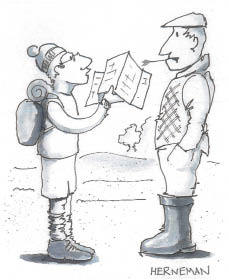I was sitting alone in a day room on the top floor of an NHS hospital. Presently, two women came in and sat down. One sat with her face in her hands, sobbing silently, while the other leant forward and whispered to her. Far from being consoled, the crying woman broke down still further and her sobs became faintly audible. What level of personal modesty was this, I wondered, that was reluctant to disturb the silence of a hospital day room, even in the midst of such grief?
Then the quiet of the day room was roughly broken by a man shouting my surname at me. He then led me at a fast walking pace along a corridor and into a small side-office, where he briskly introduced himself with a brief, impersonal, almost contemptuous handshake. This was the consultant.
There was another, younger man in the room. The second man I took to be a pupil or student. His handshake was warm and welcoming — fraternal even. The consultant, who clearly wielded his power with little or no grace, ordered me into a chair. He and his pupil sat also. ‘So why have you come to see me?’ said the consultant testily.
I had been referred to the hospital for a brain scan, query epilepsy, I said.
‘Why?’ he said.
I explained that I’d blacked out for several hours and woken up in a hotel room with no understanding of how I had got there. And when I had returned to the last pub I remembered being at, hoping to retrieve my car keys, the barmaid told me that I had been thrown out for annoying the other customers by lying on the floor and ‘pretending’ to have an epileptic fit.
He had some notes in front of him made by my GP, and he began hurriedly scribbling others on to a new page. He seemed to be fizzing with stress or anger or frustration — I couldn’t tell precisely which. But there again, virtually every medical professional I have seen lately has been like that. If it was moral opprobrium that was agitating this consultant, then of course I was prepared to take any amount of it on the chin, for I was taking up time and money with a self-inflicted injury. Moral opprobrium I could and would accept as my due. But this seemed more like a barely controlled rage.
I looked at the pupil, hoping for a clue to his demeanour. The pupil, who I guessed came from one or other of the states bordering the Indian Ocean, returned my glance with a look of someone keenly enjoying a new spectator sport.
‘Any subsequent black-outs?’ barked the consultant, his black Biro poised agitatedly above the page.
‘Every time I’ve had a drink,’ I said. ‘But the black-outs have not been for as long.’
‘And how much do you drink in a session?’
‘Six, seven pints of lager,’ I said. ‘Maybe a few Jägerbombs.’
‘Seven pints!’ he exclaimed, looking in despair at his pupil. ‘I could never drink that amount.’
‘Well how much do you drink when you go out?’ I said, already tiring of this man.
‘Two pints is all I can take these days,’ he said. ‘Three and I’ve had too much. It beats me how you chaps can drink that much.’
I looked again at the student. He looked comfortable, inscrutable. He also looked as though he might be a follower of the Prophet Mohammed, so I resisted the impulse to ask him how much he drank at a time.
‘Any recent head injuries?’ said the consultant, returning to his form.
There were, I said. I told him about the time I’d driven my car head on into the front of a London bus, banged my head on the windscreen, and woken up several hours later in hospital. I also mentioned recently waking up with a head injury for which I had no plausible explanation.
‘And how often do you go out and drink this amount?’ he said. ‘When for instance was the last time?’
‘Last night,’ I said.
‘And how much did you drink?’
I cast my mind back. ‘I had a pint of Fosters, two glasses of white wine, and then four of us shared a bottle of absinthe,’ I said.
‘Absinthe,’ said the consultant, wearily, adding the word to his page of notes. Then he flung himself back in his chair, bitterly scanned his page of notes, sighed, then turned over the page.
‘Occupation?’ he said.
‘Journalist,’ I said.
He made no comment as he appended this to his notes. While he was jotting it down, I looked again at the student. This time I was regarded with a smile; an almost imperceptible, conspiratorial smile; but a smile nonetheless.







Comments